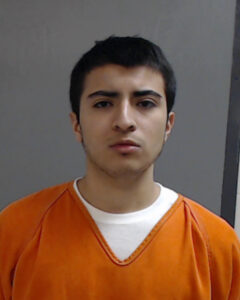|
Only have a minute? Listen instead
Getting your Trinity Audio player ready...
|

EDINBURG — A 21-year-old Roma man accused of murdering a Rio Grande City teen in 2017 wants to plead guilty after reaching a deal with the state, but it’s subject to the judge’s approval.
On Monday afternoon, visiting state District Judge Rogelio Valdez had yet to accept the conditions of the plea and set a status hearing set for June.
Sebastian Torres is charged with capital murder and tampering with physical evidence for the death of Rio Grande City resident Chayse Olivarez.
In exchange for his plea of guilty for tampering with physical evidence, Torres would be sentenced to three years of probation, receive a $315 fine to cover court costs and must testify in the trial of Philip Henry Severa, a co-defendant in the case.
“I understand there’s going to be a recommendation for the courts’ consideration, but in regards to the actual plea, you’re telling me that you’re pleading guilty because you are guilty and not because of this recommendation, is that correct,” Valdez asked Torres, to which he agreed.
Valdez said he has yet to accept the plea, stating that he may reach a decision the next time Torres appears in court.
Should Valdez accept the plea, the capital murder charge and a separate indictment also charging him with tampering with physical evidence, namely, a human corpse, will be dismissed.
Olivarez went missing in July 2017. His dismembered remains were discovered on a Roma ranch the following August.
The lead defendant, Jose Luis Garcia Jr., 22, was acquitted of one count of murder but was convicted of one count of tampering with physical evidence for which he was sentenced to eight years in prison on Nov. 8, 2019.
He had been charged with capital murder but his defense attorneys successfully got that charge reduced to murder prior to jury deliberations.
In exchange for his plea of guilty for tampering with physical evidence, Torres would be sentenced to three years of probation, receive a $315 fine to cover court costs and must testify in the trial of Philip Henry Severa, a co-defendant in the case.
Garcia was acquitted despite giving investigators a step-by-step description of the murder in a recorded confession as well as leading authorities to the place where the murder weapon was dumped.
The jury likely found that his statement to investigators was taken illegally. Valdez had instructed the jury to disregard those statements if those jurors believed they were taken illegally.
Texas Department of Criminal Justice records indicate his projected release date is June 21, 2026.
His father, 45-year-old Jose Luis Garcia Sr. attended the trial where it was revealed he was under investigation for drug trafficking. He has since been sentenced to 27 years in federal prison.
Testimony during the trial indicated that he and Olivarez’s father were alleged rival drug traffickers in Starr County.
Garcia was accused of paying Severa $10,000 in order to lure Olivarez to the Roma ranch where he was shot and killed before being dismembered and burned.
Torres was 16-years-old when he was picked up by law enforcement in August of 2017 and taken to the Starr County Sheriff’s Office where a justice of the peace read him his rights after which he was asked if he wanted to provide a statement.
He initially declined but decided to cooperate hours later.
Jesus Barrera Jr., then-justice of the peace, read Torres his rights again. Torres then signed a document stating he would make a statement.
The recorded statement was played during a November 2019 hearing in which Barrera could be heard stating that he would request law enforcement bring Torres to him after questioning in order to determine whether the statements were made voluntarily.
However, Barrera didn’t meet with Torres after the fact.
During the prior hearing, Barerra testified that the video of the interrogation was supposed to be made available to him but never was.
Abner Burnett of the Texas Rio Grande Legal Aid Public Defender’s Office, Torres’ defense attorney, argues that Texas Family Code stated that the person who magistrated Torres would determine, in writing, whether the statements were voluntary, which wasn’t done.
The state, represented by then-Assistant District Attorney Melisandra Mendoza, argued that the section only required that Barrera make a determination if he had requested that Torres and the video statement be returned to him and if he viewed the recording with Torres or had Torres view the recording to enable Barrera to make that determination.
Mendoza added that Torres’ statements should be admitted because they contained facts that were found to be true, but the judge was unconvinced.
Valdez stated he thought it was clear from the language that if that section of the family code was not strictly compiled with, the solution was not to admit the statements into evidence.
Last week, the Texas Court of Criminal Appeals issued an order affirming Valdez made the correct ruling.



